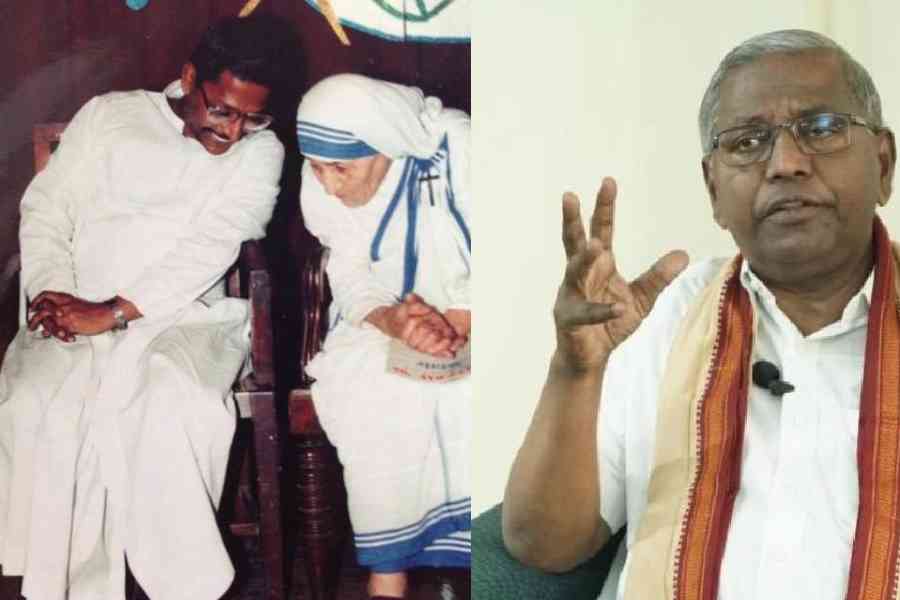A young man who traces his roots to Tamil Nadu came to Calcutta in June 1973 with “a lot of eagerness”.
He was inspired by Rabindranath Tagore and considered Swami Vivekananda his “guru”.
In June this year, he completed 50 years of Jesuit service in Calcutta.
Father Felix Raj, founder vice-chancellor of St Xavier’s University and former principal of St Xavier’s College, Calcutta, arrived in the city when it was a go-to destination for many. Now, Calcutta faces an exodus of the young.
Father Felix Raj shared some of his experiences with Metro.
No politics, please
When Father Felix Raj came to Calcutta, (barrister, diplomat and Congress leader) Siddhartha Shankar Ray (1920-2010) was the chief minister of Bengal. The violent Naxalite movement was thriving. “There was a lot of unrest and violence, especially in universities and colleges. That disturbed me,” Father Felix Raj said.
The Chhatra Parishad, the formidable students’ wing of the Congress, was keen on opening a unit at St Xavier’s College.
One day, members of the Chhatra Parishad barged into the Park Street campus and were preparing to paste posters on the walls inside. The team, and the students’ wing, were led by Priya Ranjan Das Munsi, one of the tallest Congress leaders from Bengal who passed away in 2017.
“When Das Munsi entered the college, he found (former vice-principal) Father Paul Joris (1904-1991) standing in his white habit. Father Joris calmly asked Das Munsi to paste a poster on his robe before pasting more on the walls. Das Munsi was taken aback,” Father Felix Raj said.
He went on: “The news reached Siddhartha Shankar Ray, the chief minister and a former student of the school. Soon, Ray sent a messenger with a very blunt message: ‘No politics in St Xavier’s. Please do not interfere in my alma mater.’ It worked. Das Munsi and his team retreated.”
Mini-Europe
St Xavier’s was like a “mini-Europe” when Father Felix Raj arrived. “A majority of the fathers were Belgian. There were only a couple of Indians,” he said.
Calcutta itself had an “Anglicised, Western vibe”.
“It was home to a large number of Anglo-Indians, Chinese and many non-Bengalis. Calcutta was very cosmopolitan. The Bengali population included a large number of wealthy businessmen. In the 1970s, Bengalis were controlling a lot of businesses. That image of Bengalis having a lot of business acumen has now changed.
“The number of Anglo-Indians and Chinese has dwindled. They have migrated. Not only them. Bengalis and non-Bengalis are also looking for better opportunities outside Bengal. In the 1970s, students from neighbouring countries would come to St Xavier’s for higher studies. That included students from royal and other aristocratic families. Now, there is an exodus from here. More and more young people are moving out,” said Father Felix Raj.
Loss of face
The academic and intellectual face of Bengal and Calcutta has lost sheen, he said. The lack of private investment in the education sector is to blame, according to the educationist. He linked it to the policies of the Left regime, which came to power in Bengal in 1977.
“Back then, there was no private university in Bengal because of the Marxist policies of the government. Even today, there are only a dozen-odd private universities in the state. States like Tamil Nadu, Andhra Pradesh, Karnataka and Madhya Pradesh have over 50. Private investment in the education sector started very late in Bengal. That is a big reason for the exodus of young people,” Father Felix Raj said.
He also criticised the Jyoti Basu government’s decision to drop English as a compulsory language for primary students. “It was a major setback. Generations have suffered because of that decision,” he said.
Female force
The “focus on the feminine dimension to divinity” is “unique” to Bengal, feels Father Felix Raj.
“The way Goddess Kali and Goddess Durga are worshipped here is a testament to that. Not only that. Think of Mother Teresa. Had it been Delhi, Chennai or anywhere else, she would not have been declared a saint. Calcutta had made her a saint even before the Vatican announced her sainthood,” said Father Raj.
Even if Calcutta is not the city of yore, it still retains its pluralist character, feels Father Felix Raj. “It is open to any culture, religion. It learns, accepts and adapts. This is the richness of the Bengali ethos,” he said.











